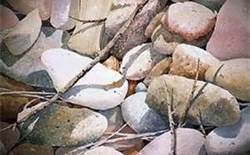
Today my local newspaper’s sports section shared the words of Washington Redskins General Manager Bruce Allen who says the team will not consider any name change:
“There’s nothing that we feel is offensive,” Allen said.
As “proof”, the team has posted on their web site “interviews with officials from the 70 high schools they say still called themselves ‘Redskins.'”.
This is not a new controversy but it is back in the news after a forum sponsored by the Smithsonian discussed the offensiveness of the name:
The symposium on “Racist Stereotypes and Cultural Appropriation in American Sports” was a day-long assault on the use of Native Americans as sports mascots. It was a thorough prosecution, delivered by a dozen or so mostly academic speakers before an audience of more than 300 people.
The speakers took issue with the standard defense offered by past Redskins owners that the name is a way of honoring Native Americans.
“Honors like that we don’t need,” said Robert Holden, deputy director of the National Congress of American Indians.
Those team owners have been steadfast in resisting a name change citing “many, many Indian chiefs”, certainly not as compelling as “70 high schools” but enough for Jack Kent Cooke:
“I have spoken to many, many Indian chiefs who say they have no objection whatsoever to the nickname. As far as I’m concerned, it’s a dead issue. I’m not even interested in it. The name of the Redskins will remain the Redskins,” the late Jack Kent Cooke said in 1994
Washington DC radio station WTOP writer Dave Johnson on their history of rejecting the name:
Back in 1991 WTOP made a decision to stop using the name Redskins because it was offensive to Native Americans. It was a well-meaning call of then General Manager Michael Douglass. It did not start a trend. Other media outlets did not follow WTOP’s lead. As I recall it was generally scoffed at.
In college sports offensive nicknames have been dropped. Syracuse is no longer the Orangemen, but just the Orange. St John’s is no longer the Redmen, but the Red Storm.
At least one newspaper, the Kansas City Star, did follow WTOPs lead, refusing to use “Redskins” and referring to the club as “the Washington football team”. From the Kansas City Star last fall after a letter writer complained about the Star’s policy:
I remain unconvinced by every argument I’ve ever heard that the name is not a racial epithet, plain and simple. And I’ll even break my usual rule about commenting on issues outside The Star’s journalism to say that I find it inconceivable that the NFL still allows such a patently offensive name and mascot to represent the league in 2012.
So, what do you you think? Is “Redskins” offensive or are complaints about the name “political correctness run amok”?
(Crossposted from Views from North Central Blogistan)
71 comments